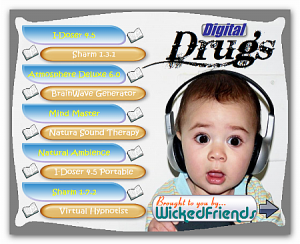Back in March, three students at Mustang High School in Oklahoma were sent to the principal's office for appearing to be under the influence of alcohol or other drugs. When asked why they were acting strangely, the students said they had used digital drugs. They were referring to i-dosing, listening to binaural beats to achieve a variety of different mental states ranging from relaxation, to focus, to pain relief.
Binaural beats work by combining tones in each ear through a pair of headphones and are designed to alter brainwaves.
But can listening to a specific tone actually get you high? Probably not. There are no studies showing neurological changes from listening to the tones available on digital drug websites. If anything, the tones may provide a placebo effect. Psychology Today points out that some studies have proven binaural beats to successfully treat anxiety and that you can walk into any Brookstone or Sharper Image and buy "sleep therapy or "brain-controller" devices."
But that's not stopping some parents, school administrators and treatment providers in Oklahoma from gearing up for a war against sound.
Sonya Colberg of NewsOK.com reports:
"I think it's very dangerous," said Karina Forrest-Perkins, chief operating officer of Gateway to Prevention and Recovery in Shawnee [OK]. While there are no known neurological effects from digital drugs, they encourage kids to pursue mood altering substances, she said.
So the fear isn't that the sounds will cause kids to get stoned. It's that the sounds might cause kids to think about getting stoned.
Oddly enough, one of these digital drug sites, i-dose.us, provides binaural beats they claim will help with kicking your nicotine habit or overcoming alcoholism. They also have tones to treat ADD, depression, and anxiety. We wouldn't want kids listening to sounds to help overcome these problems when we can just put them on real drugs like Adderal and Zoloft would we? At the same time, other sites feature ads for "legal" marijuana and hash (fake herbs and mixtures that have been sold on the internet for a very long time) and even have a "dealer" program where you can raise money for dealing these beats.
How harmful could these tones and websites really be? Eric Sterling, a seasoned drug policy expert, says that the idea isn't too much different than watching a baseball game with ads for Budweiser and generally, young people are involved in much more dangerous activity already.
How many kids are killed and injured in Oklahoma every year in connection with football or hunting? I can confidently assert -- without fear of being disproved -- that the number is greater than that of kids who are injured from the combined dangers of "digital drugs," websites promoting drugs, and marijuana.
And, of course, thinking about getting high is deviant behavior in our culture -- unless you like baseball, and watch the Major League Baseball All-Star Game on Fox, sponsored by Anheuser-Busch and Budweiser. No one is going to try to shut this website down!
This concerned reaction about sounds isn't anything new. In the mid 80's, Tipper Gore went on a rampage against music that she considered obscene after she purchased the Prince album Purple Rain, only to find out that despite being popular, Prince's lyrics weren't always wholesome. She faced off in court against Frank Zappa and John Denver who argued they had a constitutional right to create music about whatever they want. And they won because they were right. Then there's the more relevant myth that playing Led Zeppelin backwards will tell you to worship Satan or the infamous "subliminal messaging" trial where Judas Priest was sued when 2 fans attempted to kill themselves after listening to the band's music earlier in the day (and before getting intoxicated on non-digital alcohol).
If you're a frequent reader of the HeadCount blog, chances are, music has had a profound and positive impact on your life. There is no doubt that music can bring about emotions and influence some of our behaviors and whether it be rock music, gangsta rap or binaural beats, this fact has always drawn opposition and concern, especially around drugs. The Grateful Dead has had a long history of attracting the attention of DEA sting operations and they've been accused of promoting drug use in their music and culture. Many deadheads are still in prison as a result of "Operation Dead End."
Whether digital drugs pose any real threat to our nation's youth is yet to be determined. Until all the recent hullabaloo in the media, it's likely most kids had never even heard of them - though that's about to change.
